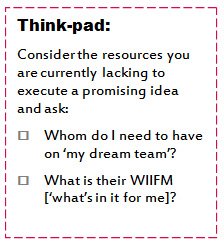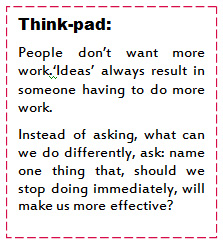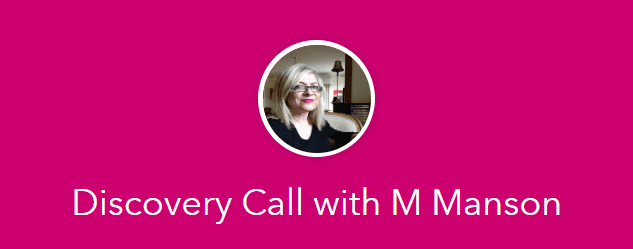 There is an epidemic. Company after company, industry after industry arecatching potentially life threatening diseases. Commodity price wars, shortage of talent, loss of relevance, low productivity and staff engagement, overwhelm of daily activities, short term focus, lack of vision, and, of course, insanity – doing the same things and expecting different results – to name just a few symptoms.infolio-rg.ru
There is an epidemic. Company after company, industry after industry arecatching potentially life threatening diseases. Commodity price wars, shortage of talent, loss of relevance, low productivity and staff engagement, overwhelm of daily activities, short term focus, lack of vision, and, of course, insanity – doing the same things and expecting different results – to name just a few symptoms.infolio-rg.ru
The cure lies in collaboration: seeing all the dots and connecting them into new solutions. But these solutions cannot be created wielding old tools.
The reason innovation doesn’t work is an out-dated model for collaboration. The prevailing, industrial era model is based on linear, supply chain/chain of command, ‘baton rally’system. It is simply not designed for the speed of response and adaptation that is required of business today.
Recently, as part of InnoFuture’s Experts Talk series, Collaboration 21, I spoke with Saul Kaplan, one of four global experts with razor sharp insights and sizzling hot systems for collaboration in the 21st century.
Saul Kaplan is a pretty cool guy. Over the 10 years when he was a partner at Accenture, he saw the firm with over 230,000 employees worldwide, change the entire business model seemingly at will. He is now leading a real-life lab that involves some 3,000 business innovators, experimenting with new business and social models. Few people are more qualified in building collaborative business models today.
His book, The Business Model Innovation Factory provides fifteen actionable principles to guide business model innovation efforts around three stages: Inspire, Connect, Transform.
He comments, “Organizations will either transform themselves to capitalize on the value in interstitial spaces (empty spaces between the silos) or they will be disrupted in the market by others that do. And for those leaders, who think they can wait it out, you can’t. The transition has already started and its pace is quickening. Just ask the youngest in your organization. Waiting is not a strategy.”
The fact about emergent trends is that they are always hidden in plain sight, visible only to those few organisations and people with the ability to connect the dots. Solutions are often very simple and require a different way of connecting existing knowledge.
But identifying the right connections requires strategic vision across many disciplines. Anything else will not bring the competitive advantage you want. E.g.:Blockbuster saw Netflix coming and did nothing. Netflix itself may be now at risk of being ‘netflixed’.
One of the biggest hurdles for Innovation Champions is to get employees in general and the thick, crusty layer of unit managers actively supporting theirinitiatives. In the industrial model of silos and hierarchy people can only easily communicate vertically, with restricted access to resources in other silos.
”How many capabilities are locked away, underleveraged in organizational or industry silos, often impossible to access because stakeholders in the status quo are threatened and won’t allow it?The biggest opportunities lie in recombining capabilities from across the grey areas between silos and can only be realized if we think and act more horizontally,” points out Saul Kaplan.
Lack of collaboration is not only detrimental to implementing new ideas but also threatens the existence of the entire organisation.

As inflexible and often counterproductive as business silos can be, the fact is, businesses thrive on processes and routines. And, these are designed and driven by peoplewith individual and diverseneeds. Therole ofa leaderis to have an answerfor everyone to this single question:what’s in it for me [WIIFM]? We invest in gaining these insights from external customers. We must apply the same approach to internal customers.
Social Media has demonstrated the power of connecting and influencing by sharing useful and interesting information. People who are best at sharinginformation can build unparalleled personal clout, without a formal title and official authority.
If knowledge is power – there has never been a better time to use it to find followers and willing collaborators around your cause.
Here is Saul Kaplan’s provocation: “Collaborators are everywhere. In each crowd there are always a few innovators that want to change the conversation but they make little progress. You will find them in the grey areas between silos. If only we could connect these ‘unusual suspects’ in purposeful ways – in purposeful networks?”
I agree with Saul: to gain speed, we need to connect the dots horizontally and laterally and find the hot spots of internal opportunities and support. And to do so we need to connect people inside the business in purposeful networks.
Here is a 3-step action plan, based on my own experience with instigating cultural change in a national retail organisation. The outcome was dramatic and lasting impact on the brand’s performance and it was achieved without formal restructure, without cost, without formal authority over any of the resources in other silos and, importantly, without a nose out of joint. This approach if part of a system InnoFuture uses to help busy innovation champions build innovation culture and capacity.
1. Inspire
 Make the strategic Vision work for you by helping people focus on what is important.Find out individual drivers of key people and help them see how it fits with the overall goal. WIIFM: what’s in it for me? That is the key to opening the silos. Help them find that key.
Make the strategic Vision work for you by helping people focus on what is important.Find out individual drivers of key people and help them see how it fits with the overall goal. WIIFM: what’s in it for me? That is the key to opening the silos. Help them find that key.
2. Inform
Make their task easy by providingbroad but cleardirectional guidelines. These are 3-4 ‘non-negotiable principles’ that help all employees quickly test their decisions, assumptions and ideas, so that they get more of them right the first time; resulting in higher productivity from minimised re-work and increasedsatisfaction. The pay-off will be the growing involvement in your initiatives.
3. Connect
Connect people in purposeful networks. Bring them onto the same page. Every culture has unique customs and rituals that reward participation ‘socially’, spiritually, and/or commercially.The secret to success is making the promise relevant and consistently reinforcing it with a routine and ritual that is endorsed by leaders.
Organisations today have many on-line and off-line platforms available. The challenge is relevance and inspired leadership. Be it software or live activities, these platforms are often an add-on. They are not linked to daily operations and frequently generate more work. Most importantly, these platforms lack the visibility of the leaders thus sending the wrong message about their relevance or ‘social’ standing of the participants.
As the Chief Inspirator I have been experimenting with innovation networks the past five years through InnoFuture conferences and live events; and, for the past 18 months, developing the innovation Dojo on-line platform. Dojo system checks all of the criteria of a purposeful employee network, bringing together Leaders, Masters, peer support, strategic and operational focus and every day improvement and innovation habit.
And, for busy Innovation Champions and Managers, Dojo comes with full content creation and the Champion’s SuperCoach support.
Leadership today, as we have learnt from Social Media, is not about the formal power but about influence derived from sharing useful information people want. Influence is the new black of leadership. You can build purposeful networks for unstoppable growth faster than you think!


